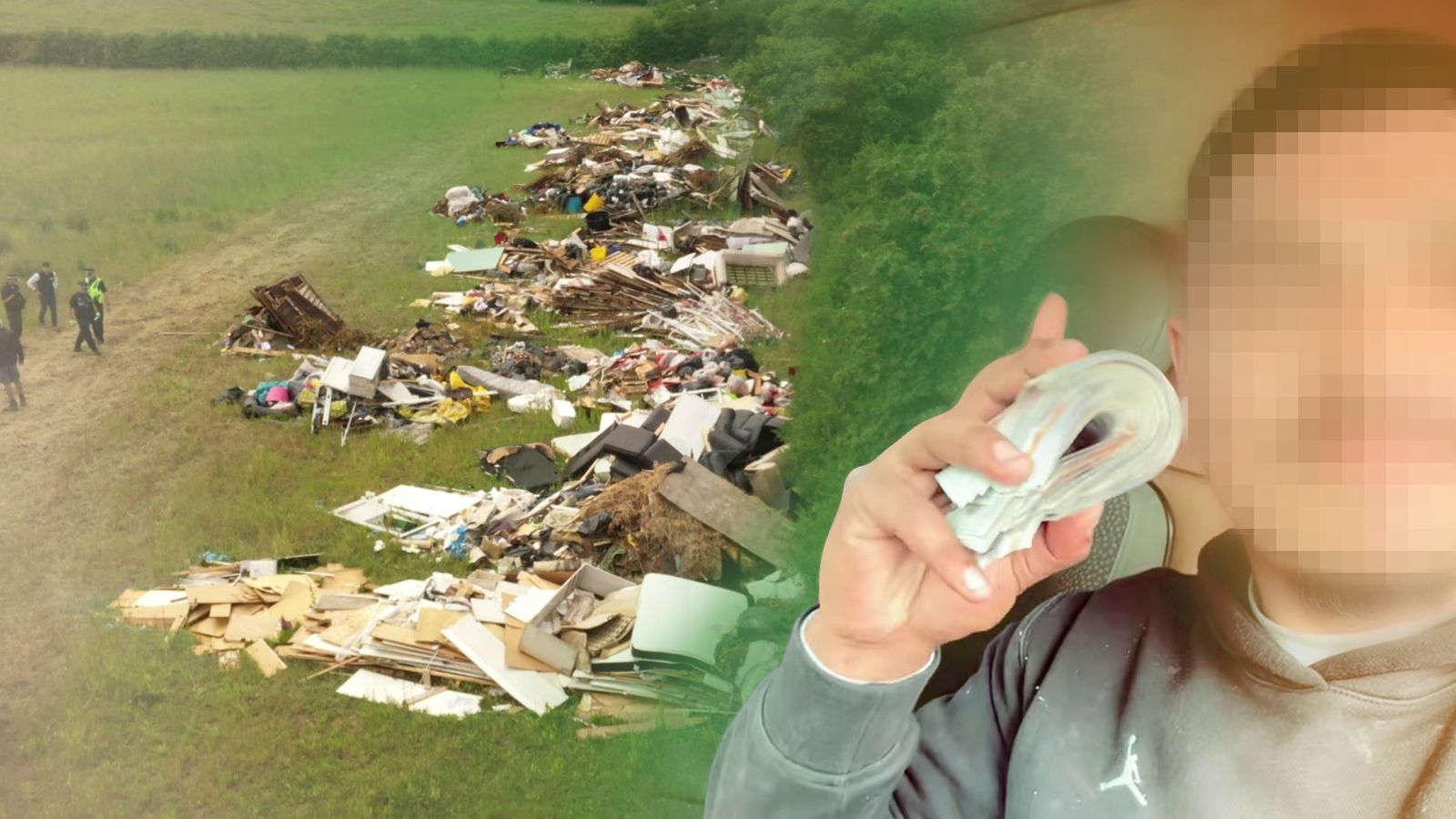Dirty work: The fly-tippers turning trash into cash
Holding up a wad of cash, Cristian smiles as he counts out £50 notes while a friend beams and waves a finger at the camera.

In other videos posted on TikTok, Cristian (not his real name) and his group appear to shovel debris into what looks like an abandoned warehouse, dance by the side of a road and fly-tip on a country lane.
While in person they present themselves as an ordinary collection of handymen, we suspect these men are part of a group who dump waste onto unlicensed sites.
We know some of them operate as private refuse collectors, and understand at least some of the rubbish they were paid to legally dispose of ended up being fly-tipped en-masse in the countryside. This is after we found tonnes of waste left to rot in a farmer's field and a Woodland Trust site.
We tracked down Cristian and his group one morning as they climbed into vans and pick-up trucks to start their day.
His name and number had been given to us by a client whose waste we found at an illegal dump site.
I told him I was a Sky News journalist and that we believe the waste he had been paid to remove was dumped illegally in the countryside.
"We don't do rubbish removals," he replied.
I asked him if he had ever made money from fly-tipping.
"I don't do rubbish in the woods," he said. When asked how he makes money, he replied "fencing".
The 'new narcotics'
Waste crime is a booming problem, which the former head of the Environment Agency called the 'new narcotics' for the way it allows organised criminal gangs to make huge amounts of money.
It costs the UK an estimated £1bn a year - yet the crime is poorly policed, little understood, and the legal punishments are often weak.
Last year, local authorities in England dealt with 1.15 million fly-tipping incidents; a 6% rise on the previous year. But just 63,000 fixed penalty notices were issued - a 5% drop on the previous 12 months - while the average court fine was worth just £530.
That's despite the ability of fly-tippers to make millions of pounds in profit.
Often they operate as legal waste operators - from a one-man band on Facebook or Gumtree, to a significant outfit posing as a legitimate company. They're paid to collect waste, but instead of taking it to a tip or landfill, and paying the requisite costs and taxes, they just dump it and pocket the profit.
"If you put it in a field, it's free," explains Dr Anna Willetts, an environmental criminal defence lawyer.
"If you take it to a Household Waste Recycling Centre or to a landfill site run by waste operators - then there's what's called a gate fee, which then has to be paid per tonne, effectively, of waste that you're depositing."
Teddy bear, wedding photos and a coffin
To uncover the perpetrators of this crime, Sky News spent eight weeks visiting fly-tip sites around Hertfordshire.
With the permission of landowners, we focused on three locations roughly three miles apart near St Albans. The smallest had just three van loads in it - the largest around 40.
Each time, the gates had been broken into overnight, and a slew of vehicles had driven across the grass. This left behind mounds of rotting waste from builders and households, as well as asbestos and clinical materials. We found everything from a child's teddy bear, to wedding photos and a coffin.
Two of the sites are owned by the Woodland Trust and the largest site belongs to a farmer. Despite being the victims of this crime, it's the landowner's responsibility to pay to remove fly-tipping. In this case, the combined cost will come to tens of thousands of pounds.
On site, we began to go through the dozens of piles and it didn't take long before we found a series of names and addresses.
These were on documents and items as varied as Amazon boxes, wedding plans, dentist appointments and welfare applications.
These individuals likely paid someone money to remove the items, expecting the waste to be dealt with properly.
'They're the bags…oh man'
Charlie (not his real name) gave a huge sigh as he went through the rubbish. We called him after finding work relating to a job of his in one of the piles. In the middle of a field where locals walk their dogs, he instantly recognised the huge white and blue rubble sacks which he'd paid to have cleared.
He said he felt "disappointed" and "cheated". He paid £300 to an individual we're calling Andrei to remove them a few weeks earlier. A skip would have cost the same amount of money, he says, but he trusted Andrei - who even had an official waste carrier's licence issued by the Environment Agency.
Based on what Charlie paid Andrei, we calculate that each individual pile of rubbish - a van load - was probably worth around £500 to the group. They should have taken it to a tip, where they would have been charged a gate fee per tonnage and paid landfill tax.
Instead, by dumping it in a field - they pocket a huge profit. We roughly calculate that just one site of 40 loads could have been worth as much as £20,000 to them in takings.
In contrast, the landowner has been quoted nearly £50,000 to remove it properly.
Later, another client whose items we found dumped nearby gave us a different name and number - Cristian. It didn't take long for us to realise that Andrei and Cristian were working together.
How we tracked down the fly-tippers
Sky News’ Data and Forensics unit took the names given to us and soon found a group of London-based waste carriers who seem to be working together.
We found the first clue in a pile of dumped building waste in a Hertfordshire field: a document with a phone number.
We followed the paper trail and were given a number by a builder. Running it through open-source tools revealed a name and face.
Then came another load and another number. A different name, but we had suspicions it was the same network.
On Facebook, the two were friends. Their photos online were recognised by the people who hired them.
On TikTok, the fly-tippers shared videos flashing cash, collecting waste and travelling in their vans. Footage showed them driving down the same remote lane as two of the fly-tips we found.
They also shared a video of them playing with a coffin; we later found the exact same one dumped in a field.
Using their own videos and photos shared online, we were able to track them to an address in north London - a residential parking area frequently shown in the background of their posts.
A couple of large buildings nearby helped us confirm the location.
Penalties 'not a deterrent' for fly-tippers
Cristian denied having anything to do with the illegal fly-tipping when we confronted him, insisting that he has nothing to do with rubbish removal.
The other men who featured in these videos all refused to comment.
But we found enough evidence to raise significant doubt on those claims, and have passed our findings over to the authorities.
Dr Willetts is frustrated by how quickly we gathered our evidence compared to the authorities.
She said: "It's difficult often for regulators to catch them, and then when they are caught, penalties are - the way they're meted out, if you like, if they're not done the right way - are low, and it's not a deterrent for them."
On the rare occasion fly-tippers are caught, the fines are often so small I've been told the criminals chalk it up as a "business expense".
St Albans City and District Council director Chris Traill said: "Fly-tipping is a criminal offence, punishable by heavy fines and even imprisonment, and the rubbish involved can be a health hazard, harm the environment and cost a considerable sum to clear up.
"When we have the necessary evidence, we will not hesitate to prosecute or fine offenders."
A Department for Environment spokesperson said waste criminals have "gone unpunished for too long", adding that in April the government launched a crackdown on "cowboy waste operators".
-SKY NEWS






